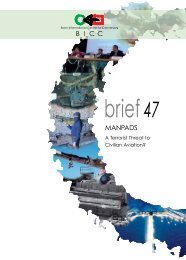egypt-final-presidential-elections-2012
egypt-final-presidential-elections-2012
egypt-final-presidential-elections-2012
You also want an ePaper? Increase the reach of your titles
YUMPU automatically turns print PDFs into web optimized ePapers that Google loves.
The Carter Center<br />
Presidential Election in Egypt<br />
of 8 a.m. These inconsistencies in opening times<br />
may have disenfranchised some voters. It is essential<br />
that the training of election officials include<br />
the importance of opening on time and the steps<br />
that election officials and other stakeholders must<br />
take to ensure that all procedures preliminary to<br />
poll opening are completed before the designated<br />
opening time.<br />
Closing procedures: During both rounds of<br />
voting, Carter Center witnesses observed some<br />
instances in which polling station officials<br />
commenced the vote count before closing the<br />
polling station. Beginning the vote count while<br />
voters are still casting ballots increases the likelihood<br />
that the <strong>final</strong> count will be inaccurate and<br />
decreases confidence in the integrity of the electoral<br />
process overall. The Carter Center strongly<br />
recommends that future training of election<br />
officials emphasizes a standardized approach to<br />
the closing of polling stations and the securing of<br />
ballots and that closing procedures should only be<br />
commenced after the conclusion of voting.<br />
Interference by candidate agents: In roughly<br />
5 percent of polling stations, Carter Center<br />
witnesses reported that candidate agents interfered<br />
in the process or actively took on roles of polling<br />
station staff. A clear distinction between polling<br />
station staff and candidate agents is necessary to<br />
promote the independence, and the perception of<br />
independence, of the electoral process. EMB officials<br />
should ensure that judges and other polling<br />
station personnel are trained on the importance<br />
of allowing only polling station staff to conduct<br />
polling activities. EMBs should also develop and<br />
implement training for candidate agents and other<br />
stakeholders to ensure they understand the limits<br />
of their roles in the process.<br />
Ballot secrecy: Carter Center witnesses observed<br />
in many polling stations that voters were not<br />
casting their ballots in absolute secrecy, for various<br />
reasons. In addition to ensuring that polling<br />
stations and polling booths are large enough to<br />
facilitate ballot secrecy, election officials should<br />
also ensure that the right to vote in secret is<br />
incorporated into voter education efforts and that<br />
election officials are well-trained on both the<br />
importance of ballot secrecy and how to ensure<br />
that polling station rooms are best configured to<br />
ensure ballot secrecy.<br />
Determination of ballot validity: Carter Center<br />
witnesses observed inconsistencies at the pollingstation<br />
level in the determination of whether<br />
a marked ballot was valid or invalid. There did<br />
not appear to be systematic review at the District<br />
General Committee (DGC) level of pollingstation-level<br />
decisions regarding ballot validity,<br />
even though the law grants DGCs authority to<br />
review and modify such decisions. Future electoral<br />
processes would benefit by developing training<br />
for election officials and other stakeholders on<br />
their roles in the process of determining and<br />
challenging ballot validity at the polling station<br />
and DGC level.<br />
Use of secure, tamper-evident bags: Although<br />
The Carter Center observed that the transport<br />
of sensitive materials generally took place in an<br />
orderly and efficient manner, the process still<br />
allowed for the possibility of tampering. The<br />
Carter Center reiterates its recommendation that<br />
future EMBs consider the use of secure, tamperevident<br />
bags for the transportation of materials, as<br />
a further protection against electoral fraud.<br />
11. Ensure timely notification of procedural changes.<br />
Changes to procedures close to or on polling days,<br />
such as last-minute modifications, can create a<br />
host of challenges. It is therefore essential that<br />
EMBs prioritize the timely release of election regulations<br />
and procedures. The Carter Center recommends<br />
that in cases of unavoidable late changes<br />
to the regulations or procedures, the EMB takes<br />
immediate steps to ensure that all stakeholders<br />
(including the electorate) are alerted to and, as<br />
necessary, trained on the new regulations and<br />
procedures and that the EMB coordinates quickly<br />
with other agencies to ensure that these changed<br />
procedures and policies are properly implemented.<br />
71



